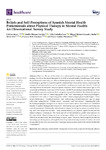Mostrar o rexistro simple do ítem
Beliefs and self-perceptions of spanish mental health professionals about physical therapy in mental health: an observational survey study
| dc.contributor.author | Bravo, Cristina | |
| dc.contributor.author | Minano-Garrido, Emilio | |
| dc.contributor.author | Carballo-Costa, Lidia | |
| dc.contributor.author | Muñoz-Cruzado y Barba, Miguel | |
| dc.contributor.author | Solé, Silvia | |
| dc.contributor.author | Rubí-Carnacea, Francesc | |
| dc.contributor.author | Catalán-Matamoros, Daniel | |
| dc.date.accessioned | 2024-01-17T09:33:52Z | |
| dc.date.available | 2024-01-17T09:33:52Z | |
| dc.date.issued | 2023-12-11 | |
| dc.identifier.citation | Bravo C, Minano-Garrido E, Carballo-Costa L, Muñoz-Cruzado Y Barba M, Solé S, Rubí-Carnacea F, Catalan-Matamoros D. Beliefs and self-perceptions of spanish mental health professionals about physical therapy in mental health: an observational survey study. Healthcare (Basel). 2023 Dec 11;11(24):3136. | es_ES |
| dc.identifier.issn | 2227-9032 | |
| dc.identifier.uri | http://hdl.handle.net/2183/34940 | |
| dc.description.abstract | [Abstract] Objective: The aim of this study is to understand the image, perception, and beliefs regarding the role of the physiotherapist in the field of mental health physiotherapy, both among the professional community and other multidisciplinary teams. Methods: An observational phenomenological qualitative study through the administration of an ad hoc survey comprising both categorical and open-ended as well as quantitative questions was conducted. Results: A total of 368 responses were analysed. The participants comprised 78.4% women with a mean age of 37.5, an average professional experience of 14.33 years, and 88.3% practicing physical therapists. From the qualitative analysis conducted, three categories emerged in relation to the obtained responses: (a) functions with codes of "improving quality of life" and "intervening in physical pathologies"; (b) objectives with codes of "Improving quality of life", "Intervening in physical pathologies", "Functional rehabilitation", "Health promotion", and "Intervening in mental disorders"; and (c) image with codes "unfamiliarity", "holistic vision", "necessity", and "importance". Regarding the tools, the findings highlight a strong focus on physical exercise interventions due to their well-established benefits. Cognitive strategies like therapeutic relationships and cognitive-behavioural techniques were also prominent. Additionally, embodiment techniques involving movement, relaxation, breathing, and voice usage were notable. Lastly, manual therapy and physical agents formed another distinct category. Conclusions: The vision and role of this professional profile were unknown to the respondents. Despite being perceived as having a holistic view of the patient and being considered an essential need, the actual image remains vague. However, there is significant interest, indicating a promising future, although the lack of specialized training is noted. Therefore, the need for specialized education and awareness campaigns among professionals in the mental health field is highlighted. | es_ES |
| dc.language.iso | eng | es_ES |
| dc.publisher | MDPI | es_ES |
| dc.relation.uri | https://doi.org/10.3390/healthcare11243136 | es_ES |
| dc.rights | Creative Commons Attribution 4.0 International License (CC-BY 4.0) | es_ES |
| dc.rights.uri | https://creativecommons.org/licenses/by/4.0/ | * |
| dc.subject | Body awareness | es_ES |
| dc.subject | Mental health | es_ES |
| dc.subject | Physiotherapy | es_ES |
| dc.subject | Therapeutic alliance | es_ES |
| dc.subject | Therapeutic exercise | es_ES |
| dc.title | Beliefs and self-perceptions of spanish mental health professionals about physical therapy in mental health: an observational survey study | es_ES |
| dc.type | info:eu-repo/semantics/article | es_ES |
| dc.rights.access | info:eu-repo/semantics/openAccess | es_ES |
| UDC.journalTitle | Healthcare | es_ES |
| UDC.volume | 11 | es_ES |
Ficheiros no ítem
Este ítem aparece na(s) seguinte(s) colección(s)
-
GI-IPRF - Artigos [139]






